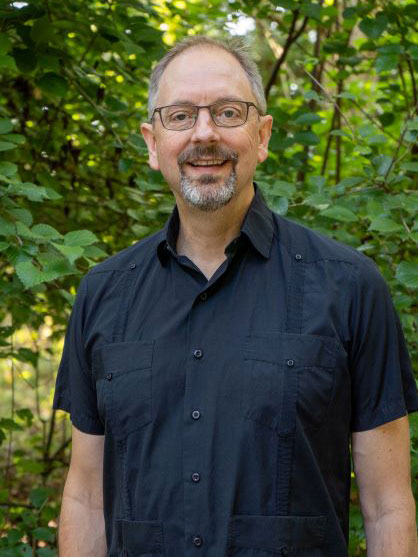
Erik D. Lindquist, Ph.D.
Distinguished Professor of Biology and Environmental Science; Chair, Department of Biological Sciences
Interest and areas of expertise
Conservation biology of Neotropical amphibians, tropical cloud forest canopy ecology, woodland vernal pool ecosystems, phylogeography, science and religion dialog, reconciliation ecology, and sustainable community development.
Education
- 1991, B.S. – Zoology, Southern Illinois University, Carbondale
- 1995, M.S. – Zoology, The Ohio State University, Columbus
- 1997, Ph.D. – Zoology, The Ohio State University, Columbus
Classes I teach
- Tropical Biology
- Animal Behavior
- Biological Sciences Cornerstone
- Ornithology
- Herpetology
- Environmental Issues and Sustainable Solutions
- Nordic Cultures and Sustainability
Profile and research
Meet Dr. Lindquist: A Passionate Advocate for Science Education and Biodiversity
Dr. Lindquist has dedicated his career to teaching, research, and service in the biological sciences. His journey began with his Ph.D. research at the Ohio State University, where he explored the fascinating world of "earless" harlequin frogs, delving into their distinctive communication, ecology, and evolution. For nearly 28 years, he has focused on the conservation and management of the critically endangered Panamanian golden frog, a species he deeply cares about. His research also spans the study of hollow microfiber filters for safe drinking water in communities across Bolivia, Colombia, Ethiopia, Uganda, and Fiji, showcasing his commitment to both environmental and human health.
Lindquist’s work has taken him around the globe, teaching over 500 students across 17 countries in diverse academic and service settings since 1999. He believes that science education should be dynamic—incorporating visual, auditory, and kinesthetic elements to fully engage students. As a professor, he inspires his students to reflect on their beliefs, lives, and the world around them, encouraging them to focus on vocational pursuits marked by character and intellectual fulfillment.
Dr. Lindquist's dedication to biodiversity and the environment was recently recognized through his role as a Fulbright Specialist in Malaysia, where he focused on the conservation of local biodiversity and the environment and the training of professors in experiential learning. He has also contributed his expertise in several prominent forums, including an interview with Sir David Attenborough in the BBC documentary series, Life in Cold Blood, where he discussed the visual signaling behavior of the Panamanian golden frog. Additionally, he shared insights into the intersection of his faith and scientific work in the Reconciling Evolution feature on the Language of God podcast by BioLogos.
In his ongoing research, Lindquist explores the behavioral ecology and conservation of tropical amphibians. His studies on the endangered golden frog have provided insights into aposematic coloration—bright coloration as a warning to predators—and he actively contributes to population recovery efforts through Proyecto Rana Dorada/Project Golden Frog, a collaborative conservation initiative that he cofounded.
Beyond this, Dr. Lindquist’s research interests include biodiversity modeling, community ecology in vernal pools, the effects of disease on amphibians, the spatial ecology of cloud forest treefrogs, pesticide impacts on salamander populations, and evolutionary studies on harlequin toads. His work exemplifies a commitment to understanding and preserving the rich tapestry of life on Earth.
Outside of his professional life, Lindquist is deeply family-oriented. He and his wife Molly are the proud parents of four adult children and grandparents to seven grandchildren. They also share their home with Linnea, their beloved Labrador retriever. They have long advocated for Food for the Hungry, a faith-based international relief and development organization, underscoring their commitment to both environmental and humanitarian causes.






